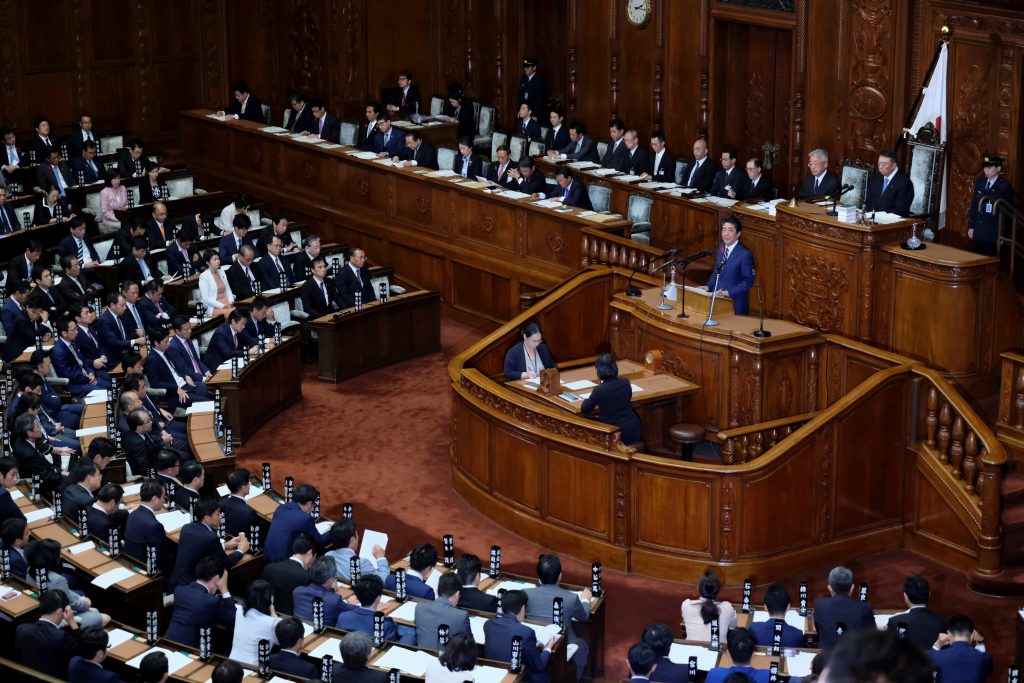
- ARAB NEWS
- 13 Jul 2025

TOKYO: Senior members of Japan's ruling Liberal Democratic Party have floated the possibility of Prime Minister Shinzo Abe, also LDP head, dissolving the House of Representatives and calling a snap general election within this year.
Some speculate that such comments are intended to keep LDP members united at a time when the Abe administration faces strong headwinds over a spate of problems, including its allegedly sloppy response to the novel coronavirus crisis and political issues, such as the recent arrests of former Justice Minister Katsuyuki Kawai and his wife, Anri, in an election campaign scandal.
In reality, however, it is difficult for Abe to dissolve the all-important lower chamber of the Diet, Japan's parliament, at an early date, as the tough work to rebuild the Japanese economy, which has taken a hard hit from the coronavirus crisis, awaits the administration while factors that would help shore up public confidence in the government are scarce, analysts said.
"The possibility (of the Lower House being dissolved) this autumn or later to coincide with the compilation of new economic measures is not zero," Akira Amari, chairman of the LDP's Tax System Research Commission and close ally of Abe, said in an interview with Jiji Press on Thursday last week.
Hiroshi Moriyama, the LDP's Diet affairs chief, who is usually cautious about what he says, echoed Amari's view, saying in the city of Kagoshima, southwestern Japan, on Saturday that there could be a general election this year.
Speculation over a Lower House breakup grew after Abe and Deputy Prime Minister and Finance Minister Taro Aso, who is also close to the prime minister, held talks for about an hour at the prime minister's office on June 10, two days before the enactment of the government's second supplementary budget for fiscal 2020 to tackle the coronavirus crisis.
An LDP insider believes that Aso is advising Abe to dissolve the chamber this autumn. When he was prime minister more than 10 years ago, Aso was forced to dissolve the Lower House at a time not of his choice, and the LDP suffered a crushing defeat in the subsequent general election and lost power.
Dissolving the Lower House is the prime minister's sole right. One reason behind the speculation over a Lower House breakup and snap election this year is that Abe has very limited options for the strategy.
If Abe fails to dissolve the chamber this autumn, an alternative option would be at the beginning of next year's regular session of the Diet in January. But that would become difficult if a second wave of coronavirus infection hits the country around then.
If the alternative option is missed, using the snap election card will become even more difficult as the Tokyo Olympics and Paralympics, which have been postponed by one year to summer 2021 due to the virus crisis, draw near.
In the event the games are canceled due to the virus crisis continuing, dissolving the Lower House would become impossible, and even worse, Abe may be unable to stay as president of the LDP until his term of office expires in September 2021. The current Lower House members are set to see their four-year terms end in October 2021.
Abe himself has hinted at a Lower House breakup. In an internet program Saturday, Abe denied that he had talks over the matter with Aso, Amari and Chief Cabinet Secretary Yoshihide Suga when they met Friday night, saying, "We didn't discuss that yesterday."
But Abe also said: "Politicians are living in a sort of a battlefield. Dissolution (of the lower chamber) is always on my mind."
Such remarks seem to reflect the Abe administration's hope of finding a breakthrough from the current stalemate.
Public confidence in Abe's leadership and his administration has been undermined by the arrests of the Kawais, as well as policy missteps over the coronavirus outbreak and the resignation in May of Hiromu Kurokawa as chief of the Tokyo High Public Prosecutors Office for playing mahjong for money during the epidemic.
The Abe administration was once so powerful, and he was called "the sole winner." But the political landscape has changed greatly.
Abenomics, the reflationary policy mix of the prime minister, had been a driving force for the administration. But the economy has been hit hard by the coronavirus fallout while Abe is in a deadlock over foreign affairs.
Many members of the LDP are therefore skeptical about the remarks made by Abe and people close to him. "They're just trying to increase their influence by commenting at the possibility of a Lower House breakup," an LDP source said. "The chamber can't be dissolved under Abe."
An LDP lawmaker also denied that the Lower House will be dissolved under the current administration, saying that people's distrust in politics heightened after Abe failed to fulfill his accountability over favoritism scandals involving school operators Moritomo Gakuen and Kake Educational Institution.
At a press conference on Tuesday, LDP Secretary-General Toshihiro Nikai flatly denied a potential breakup of the chamber this year. "I don't think at all that the Lower House will be dissolved by year-end."
At a separate press conference on the day, Natsuo Yamaguchi, leader of Komeito, the LDP's coalition partner, said that priority should be given to measures to prepare for a second wave of coronavirus infections, sounding negative on an early Lower House breakup.
"As resuscitating Japan's economic power is another major challenge, it's important for the government and the ruling coalition to focus their efforts on dealing with such issues," he said.
JIJI Press